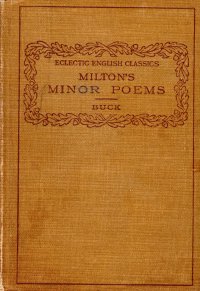 This book collects four pieces from Milton which do not have Paradise in the title and are not about his blindness. “L’Allegro” presents life as a person with a happy outlook. “Il Penseroso” presents life from a melancholy outlook. “Comus: A Masque” is a brief verse play wherein the sorceror child of Circe and Bacchus tries to tempt a virtuous woman to give up her life of chastity and to enjoy natural, sensual delights. And “Lycidas” is an elegy for a drowned companion that detours into political commentary that diminishes its impact.
This book collects four pieces from Milton which do not have Paradise in the title and are not about his blindness. “L’Allegro” presents life as a person with a happy outlook. “Il Penseroso” presents life from a melancholy outlook. “Comus: A Masque” is a brief verse play wherein the sorceror child of Circe and Bacchus tries to tempt a virtuous woman to give up her life of chastity and to enjoy natural, sensual delights. And “Lycidas” is an elegy for a drowned companion that detours into political commentary that diminishes its impact.
It’s less than a 100 pages, these four works sandwiched with a pair of essays about Milton, his time, and his relationship to the Revolution at the time.
To modern readers, even to me a bit, the poems are a bit long-winded and slow without the punchiness that I prefer in shorter modern poems. However, to someone who’s steeped in older poems, though, they read pretty well and have a lot of nice little turns of phrase. Of course, my college poetry professor would point out that I shouldn’t write poems like this–as I did early in college. But I got more punchy.
And these weren’t onerous to read–like some of the wordy, wordy Romantic poet works. So a pleasant way to spend a couple of hours.
These little hardback editions from around the turn of the century seem to have been fairly common–in addition to this volume, I have a couple of works from Alexander Pope in similar editions from similar series. This series, the Eclectic English Classics, look to have cost twenty cents. I wonder if they were the Walter J. Black books of the day.
And I will probably read one of the Pope books–I since I just bought Essay on Man at the last book sale, it’s right on top–before I finish my complete works of Keats and Shelley. Or the Shakespeare I started years ago. Because these little books are Classics, and they’re not daunting. Which was probably their appeal a hundred plus years ago as well. It’s only the reading public that has changed.



1 thought on “Book Report: Milton’s Minor Poems by John Milton, edited by Philo Melvyn Buck, Jr. (1894, 1911)”
Comments are closed.